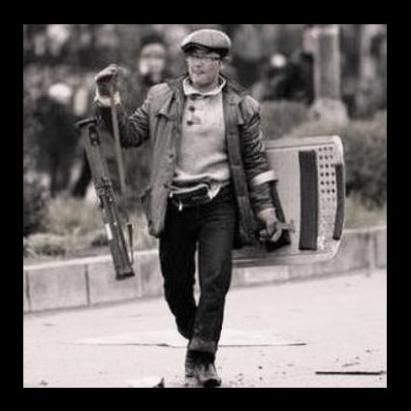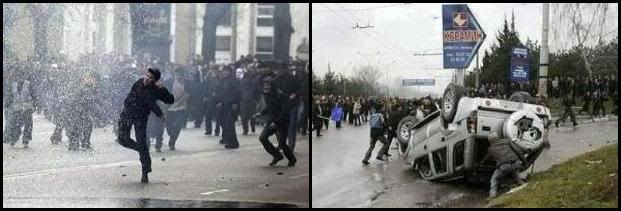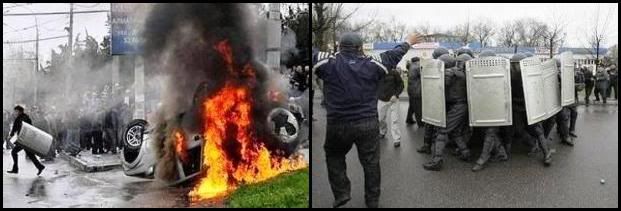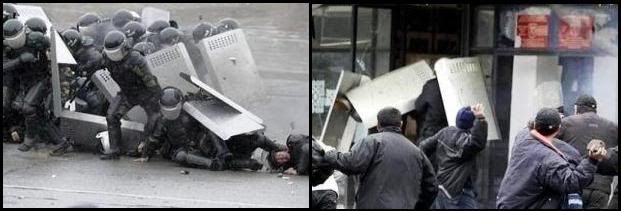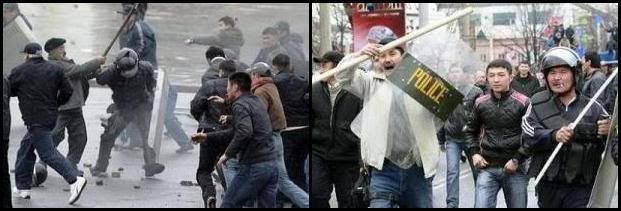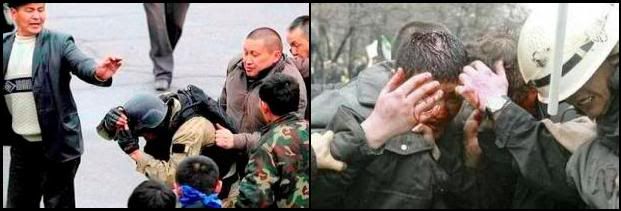Praiseworthy courage, and inspirational, cuz it’s nearing time for the rest of us to think about doing similar. When are regular working people gonna get angry enough at the cut backs and the cost increases that the Western elite consensus says ‘must’ get much much worse? Angry enough to, you know, imitate our Kyrgyzstanian betters, perhaps? The comments under the Times of London report on the revolt were instructive:
Sarf of the River wrote:
The UK could do with a pro-democracy movement.
Max Bygraves wrote:
I saw the footage on the BBC.
It looks like 28 days later.
I wonder if it’ll happen here, when people go hungry . . .
rob robbo wrote:
It’s sad that people have died, but when any government is corrupt, it’s the duty of the population to overthrow them by any means.
Government austerity measures were particularly clumsy, brutal and extreme in Kyrgyzstan, of course, so it became time for anger and action. The immediate trigger (fuel price increases) of the revolt, links to background on the ‘Great Game’ between Russia and the U.S., and the (yay, bad!) implications for the U.S. war on Afghanistan, all below the fold. First, this is what the first 21st century revolt against austerity looks like: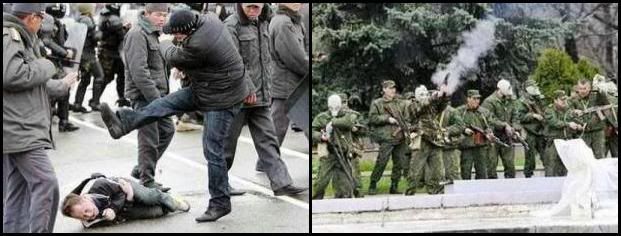
Provocations; firing on demonstrators.

Dead protestors.
IMMEDIATE TRIGGER: 500% COST OF HEATING INCREASE
Bakiyev faces protests over fuel bills hike
By Timur Toktonaliev
Feb 25, 2010
Asia TimesSharp increases in the price of electricity and central heating have left many in Kyrgyzstan struggling to survive. The price for electricity has already doubled this year and the cost of central heating has shot up by 500%.
The Kyrgyz government says it has been forced to cut subsidies and pass on the real cost of utilities to the consumer so as to cope with the effects of the world economic crisis and to build up funds to invest in the energy sector. Officials say it costs more to generate electricity and provide hot water than business and domestic customers pay. The increases match the cost price, they say.
Consumers are less than enamored of the scheme. A straw poll of 63 people conducted by Institute of War and Peace Reporting on the streets of Bishkek produced a unanimously negative response.
“What have I got to be happy about?” said a female pensioner who lives on her own. “I get 2,500 soms [US$56] a month … I don’t have enough to live on. And now they’ve added on 130 soms and I’ll have to pay 350 soms [monthly] for hot water.” . . .
[Opposition leader Azimbek] Beknazarov recalled that one of the demands in the March 2005 “Tulip Revolution”, when Askar Akaev was ousted as president by a popular uprising and the present head of state, Kurmanbek Bakiyev, came to power, was that he would reduce utility rates and provide the entire population with electricity.
“President Bakiev has not done this,” he said. “On the contrary, by privatizing the energy sector and increasing prices, he is doing what Akaev didn’t have time to do.” . . .
WILL KYRGYZSTAN KICK OUT U.S. BASES?
AP writes that the opposition leadership “has called for the closure of the U.S. air base in Manas outside the capital of Bishkek that is a key transit point for supplies essential to the war in nearby Afghanistan.” Whether that will actually take place is hard to predict, of course. The New York Times elaborates on the mess the U.S. has gotten itself into:
“opposition leaders were angered last spring when Obama administration officials courted Mr. Bakiyev — who they admitted was an autocrat — in an ultimately successful attempt to retain rights to the military base, Manas, used to supply troops in Afghanistan. President Obama even sent him a letter of praise. . . .
The American attitude toward Mr. Bakiyev ruffled opposition politicians in Kyrgyzstan, who said it was shameful for the United States to stand for democratic values in the developing world while maintaining an alliance with him.
The Kyrgyz president’s son, Maksim, had been scheduled to be in Washington on Thursday for talks with administration officials. The opposition views the younger Mr. Bakiyev as a vicious henchman for his father, and was infuriated that he was granted an audience. The State Department said late on Wednesday that it had canceled the meetings.
Opposition leaders have been divided in recent weeks over whether they would continue to allow the American military base to remain, but it seems clear that they harbor bitterness toward the United States. And neighboring Russia, which has long resented the base, has been currying favor with the opposition.
“The political behavior of the United States has created a situation where the new authorities may want to look more to Russia than to the United States, and it will strengthen their political will to rebuff the United States,” said Bakyt Beshimov, an opposition leader who fled Kyrgyzstan last August in fear for his life.
Mr. Beshimov was one of numerous opposition politicians and journalists who in recent years have been threatened, beaten and even killed. . . .
‘NEW’ GREAT GAME LINKS:
Petraeus drums up support in Kyrgyzstan
By Farangis Najibullah
Mar 17, 2010
Asia Times
Obama’s Big New AfPak Problems
William Bradley
April 7, 2010
Huffington Post
Kyrgyzstan at the hub of superpowers’ plans
By Nick Childs
April 7, 2010
BBC News


